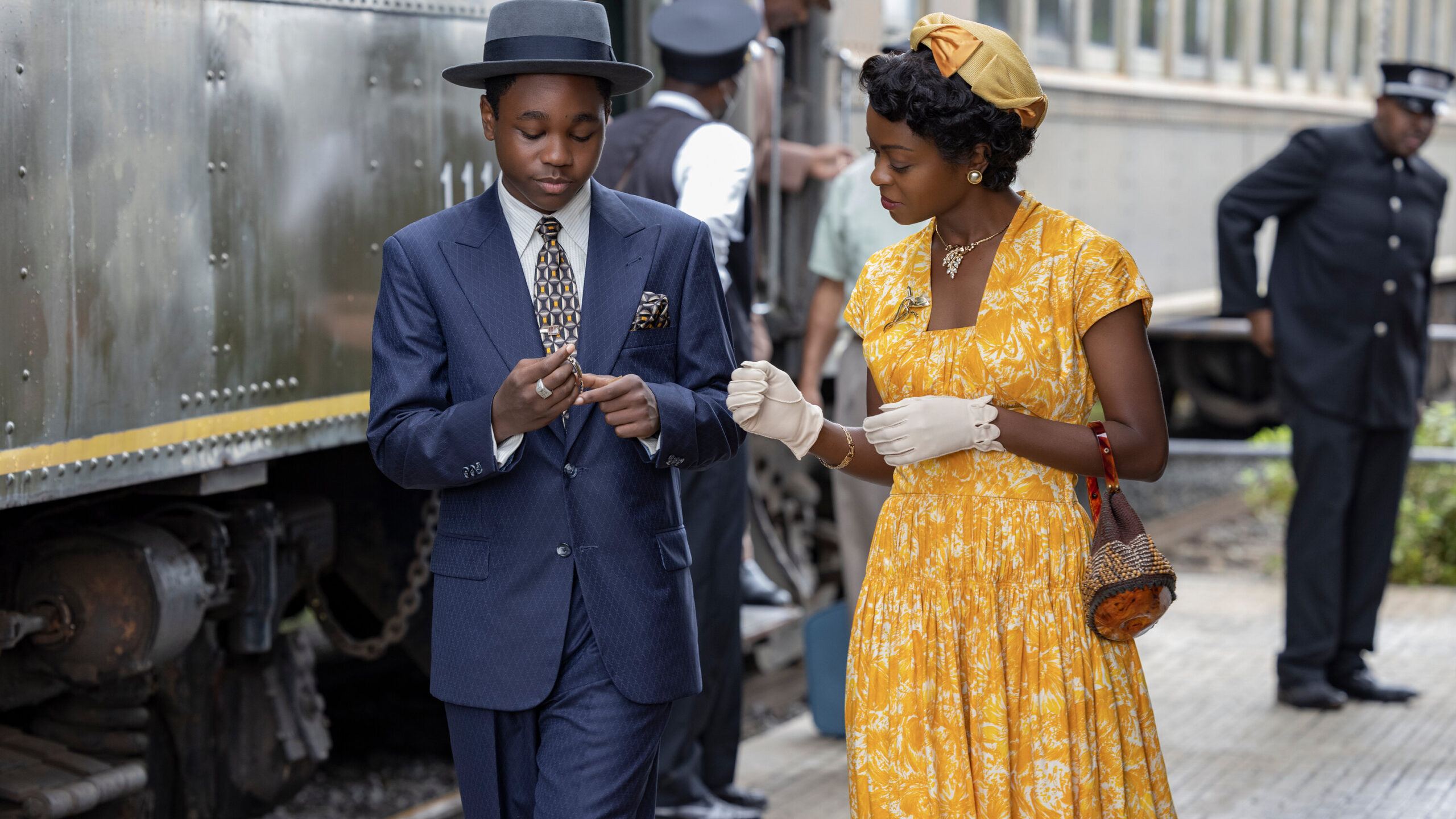Reading about the death of Emmett Till is one of those experiences that makes you grow up a little, as you learn about the depths of human hatred and prejudice. Like Spielberg did with Schindler’s List, Till takes those horrifying pictures and puts them into a movie, helping people transport back in time to understand racism’s dehumanizing violence anew. Also like Schindler’s List, the movie plunges into the darkness and finds the star that eventually bursts into light: Emmett Till’s mother, Mamie (Danielle Deadwyler).
Despite his tragic death, Emmett (Jalyn Hall) did not live a long suffering racism filled life. Mamie and her parents (Whoopi Goldberg and Frankie Faison) moved from Mississippi to Chicago in the 1920s and mostly enjoyed a happy life of jokes and songs. In 1955 at age 14, Mamie sent Emmett on that fateful vacation down to Mississippi to visit his uncle Moses Wright (John Douglas Thompson) and Emmet’s cousins. On August 24, Emmett and the cousins went to Bryant’s Grocery and Meat Market in the town of Money to buy candy. There, (falsely) according to the grocery owner Carolyn Bryant (Haley Bennett), Emmett threatened and whistled at her. And in Mississippi in 1955 as a black man, that’s basically a death sentence. Poor Emmett was lynched to the point of unrecognizability, cementing poor Mamie’s greatest fear that her son would never come home. Emmett’s murder then propelled Mamie front and center into the Civil Rights movement, where she was forced to rise to the occasion to defend her son in the face of the worst of humanity.
Till ends where it probably should have started. Writer/director Chinonye Chukwu correctly decides to focus most of Till’s story around Mamie. However, she probably got a LOT of pressure from the studio to include as much of Emmett’s murder into the movie as possible. Chukwu does a good job not turning the movie into trauma porn, and elegantly and tensely lays out the events that led to this horrible crime in heartbreaking fashion. But that level of care means the events of Emmett’s lynching take up to 45 minutes of screen time and permanently alters the tone of the movie into something much more despondent. That’s too bad, because Mamie’s tale, though coming from grief and heartbreak, is actually quite the hero’s tale. Mamie Till discovered her life’s purpose over the course of this horrible part of her life, catapulting her into a public figurehead and education activist. Other than through pre-credits words, we don’t see any of that, instead focusing on Mamie’s transition from grief stricken mother to civil rights crusader. It’s still plenty satisfying to see Mamie find her purpose, but the amazing woman has done so much in her life it would have been nice to see more of that transformation take place.
But that transformation is mesmerizing because of Danielle Deadwyler’s incredible performance. One of the talented actor’s best skills is carrying suppressed emotions. Mamie’s ALWAYS carrying something underneath the surface, perfect match of character and actor. Early on, that emotion is dread, as Mamie puts on a happy face for Emmett while trying to warn him about the hate he’s about to travel into. Then after Emmett’s murder, Deadwyler releases all of that suppressed dread in the form of visceral, primal sadness in front of her loved ones. Once the cameras and writers start showing up for interviews, Deadwyler shows Mamie burying those feelings again, putting on a brave public image she can barely keep together. Mamie’s sadness morphs into anger, which is present in Deadwyler’s face, but never released in public; only in private amongst trusted friends/loved ones. The scene on the stand in the Mississippi courthouse is riveting because of how Danielle Deadwyler is saying everything without uttering a word, despite all efforts to force Mamie’s anger to the surface to make her look like an “angry crazy black woman” like the prosecutors wanted. Because by the end, all of Mamie’s suppressed fear has been replaced by a steely resolve which grows with each public appearance and setback, which the audience welcomes thanks to Danielle Deadwyler’s wonderful talents.
As the saying goes, “Those who cannot remember the past are condemned to repeat it.” Till is a necessary reminder of the horrors of racism, hate and prejudice Emmett Till, Medgar Evers, and countless others faced in the United States for hundreds of years, and continue to face to this day. However, I hope Till is also a reminder of how within this vile murder arises a hero like a phoenix. Mamie Till was one of “Those who have leadership thrust upon them, and take up the mantle because they must, and find to their own surprise that they wear it well.” That’s right millennials, Mamie Till is Albus Dumbledore approved. She would have been an excellent Griffyindor, for sure.

